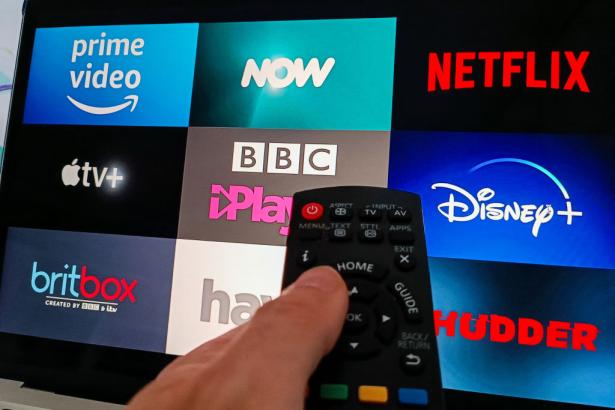If there’s an iron law for twenty-first-century capitalism, it’s that private equity and big corporate capital will enshitify anything it can get its grubby hands on. Most recently, the finance class was in the news for destroying the Red Lobster chain, depriving us regular folks of a decent meal out. The same forces are also setting out to ruin the entertainment industry and those who work in it.
As Bessner writes, the original strategic streaming play was to pump up subscriber numbers, dominate market share, and cash out at scale. But the strategy failed, particularly as credit became more expensive, and now the industry is flailing, bilking its writers and actors and foisting ads on subscribers in a grotesque return to something a lot like cable TV.
Land of IP-Milking Garbage
In his piece, Bessner recounts screenwriter Alena Smith’s experience in Hollywood during the streaming era, and it’s not a pretty picture. It’s what you’d expect from Apple, though: demanding too much, offering too little, and wringing a worker dry without regard for them as a human being.
Smith explained to Bessner how the rush of money into streaming ultimately left writers feeling swindled.
“It’s like a whole world of intellectuals and artists got a multibillion-dollar grant from the tech world,” she said. “But we mistook that, and were frankly actively gaslit into thinking that that was because they cared about art.”
If you stream television or film, you’re familiar with the contemporary frustrations of the model. You were promised no ads and endless choice. Instead, you got ads and, well, endless choice — but it was a Faustian bargain.
Now, you’re subscribed to half a dozen increasingly expensive services, increasingly supported by ads, and increasingly filled with intellectual property (IP)–milking garbage and countless other options that are indistinguishable from one another and from what you got on cable a decade or two ago.
Cable TV Strikes Back
John Koblin, in the New York Times, writes
Ads are getting increasingly hard to avoid on streaming services. One by one, Netflix, Disney+, Peacock, Paramount+ and Max have added 30- and 60-second commercials in exchange for a slightly lower subscription price. Amazon has turned ads on by default. And the live sports on those services include built-in commercial breaks no matter what price you pay.
The reason is predictable — the companies want to make a profit and they’re struggling to do so. They can only hack away labor costs so much, which they’ve long tried to do, even as writers and actors went on strike last year. And the market, already stretched thin, can only afford so many price increases. Ads are one way to boost the balance sheet.
Put this all together and it becomes really hard to distinguish streaming from cable, even if the ad burden is lower with the former. You still have ads, the cost of subscriptions adding up to the equivalent of a cable TV package, and familiar programs chock-full of stock settings, plots, and tropes.
The familiarity is no accident. The old TV and film players are as much a part of the new streaming entertainment industry as the new move-fast-and-break-things tech bros are. And they’re all selling the same thing. Same as it ever was.
As Bessner points out:
By the early Aughts, six enormous conglomerates — Disney, General Electric, News Corporation, Sony, Time Warner, and Viacom — controlled every major movie studio and broadcast network, and a substantial portion of the profitable cable businesses. The conglomerates were raking in more than 85 percent of all film revenue and producing more than 80 percent of American prime-time television.
In parallel, he notes that in the years that followed, three major asset-management companies came to dominate the most valuable publicly traded companies in the United States. You may see where this is going: the story of the decline of streaming, of its enshitification, is a tale of deregulation and big finance’s monopoly capital model, which comes in hard and, when it leaves, trails devastation.
A Vulture’s Eye View of Hollywood
In 2022, private equity investment in entertainment witnessed a sharp decline compared to the previous years. In 2021, the vultures poured a staggering $12.45 billion into the industry, but by the following year, that number plummeted to $10.6 billion. In 2023, investment hit a six-year low at a mere $2.77 billion.
This trend reflects a broader period of austerity for the industry in which workers — writers, actors, and those who make the entertainment industry work from the bottom up — are struggling to get by.
Private equity and big corporate giveth capital and they taketh away. They have essentially become arbiters of fortune in the entertainment industry. Now, as the tide turns, we are left with the worst of all worlds. The industry is collapsing, workers are bearing the brunt of the fallout, consumers are inundated with ads and saddled with ever-higher bills, and the once vibrant landscape of creativity is being suffocated by a low-risk, IP-exploiting monoculture. This grim scene is made worse by the looming specter of artificial intelligence promising more of the same — at best.
Hopefully everyone really, really enjoys Grey’s Anatomy and Blind Date. Because for the foreseeable future, they’ll be what we’re left with in one form or another.
SHARE THIS ARTICLE
CONTRIBUTORS
David Moscrop is a writer and political commentator. He hosts the podcast Open to Debate and is the author of Too Dumb For Democracy? Why We Make Bad Political Decisions and How We Can Make Better Ones.


Spread the word